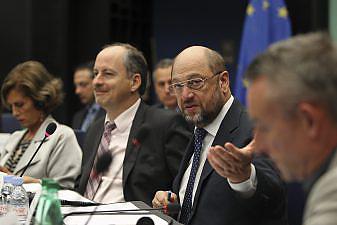The fourth estate in the European Parliament
The fourth estate in the European Parliament

The term Fourth Estate usually refers to the media, but it can mean any social or political force or institution whose influence is not officially recognized. The European Parliament has its own version of this. The Secretary General heads the EP secretariat and may be compared to the most prominent official servicing, for example, the United States House of Representatives or Britain’s House of Commons. He does, however, exert considerable political power, heading a Secretariat of hundreds of officials who rule over the Parliament. These employees are often absolutely necessary, of course, but sometimes I find myself having to fight more skirmishes with them than I do with political opponents. A few examples will serve to demonstrate this overblown power. It’s time things were changed, and this week I’ll be discussing with our political group, the United European Left/Nordic Green Left (GUE/NGL), how we can ensure that the EP is run by elected politicians rather than unelected officials.
This week I received a friendly email from one of these officials. He had been asked by the logistics service to find out what my intentions were when I requested, in the framework of the budgetary control process, an explanation as to the purpose for which the Parliament president’s official cars were used, at the same time proposing that he enjoy the use of just one rather than – as at present - two cars. Clearly this set alarm bells ringing, as my proposal had just been adopted by a majority vote of the Budgetary Control Committee. Nevertheless, the president should not be required to explain what use he put these cars to and furthermore he should surely not be asked to hand one of them back! I explained that that had indeed been my intention, at which the official who had contacted me remarked cheerily that he understood completely and that therefore the logistics service must also surely have been able to understand. Undoubtedly we will now see the inception of a lobbying frenzy aimed at ensuring that when the Budgetary Control Committee’s proposal comes before the plenary – as my indecent proposal now had that official status, giving it weight – it would nevertheless be voted down. It is my clear task to make sure that this doesn’t happen, but you have to ask yourself who you’re now fighting against, fellow elected representatives of the EU’s peoples, or unelected officials?
A short time ago I wrote a report on the proposed “European platform to enhance
EU cooperation in the prevention and deterrence of undeclared work”, which the Commission wants to set up with the aim of improving the way in which inspectorates in different member states work together and within which the European Parliament may also be represented. I wrote in my report that a MEP, or some other representative of the EP, ought to be there on our behalf. This provoked a storm of protest from the Internal Market Committee’s officials, whose opinion was that I should not have written any such thing. Members could absolutely not represent the Parliament and I would certainly be hearing from Legal Services (also, of course, made up of officials). I couldn’t understand this at all, and pointed out that the EP president represents us at the European Council and asking whether he isn’t after all a MEP? Yes, came the reply, but that was an exception, and normally it was officials who performed this function on the Commission’s countless advisory bodies. To cut a long story short, my proposal was accepted, and Legal Services lodged no official protest. And so the power of the service involved, but only of that service, was very slightly restricted.
One final example: as things stand it takes three weeks for officials (!) to look into whether written questions which a MEP wants to put to the Commission or the Council are unsuitable. They almost always have something to say: the typeface is wrong, the question is one which should be put only to the Commission and not to the Council as well, or it’s too long. If you don’t agree with their advice as to how to put your text right, there follows an even longer procedure. In the meantime I always protest and almost always get my way, but the whole process has been held up, and before an answer is received so many months have passed that the entire point of the question has been lost and the procedure rendered useless.
Officials are instructed by their Secretary General, who answers to the Bureau, the group of Members elected to be a sort of praesidium. Members of this Bureau invariably receive documentation late and have little time or opportunity to consult with their fellow MEPs. This has to change, and via the GUE/NGL representative on the Bureau I am going to attempt to ensure that we get things on time and that this Fourth Estate returns to performing its necessary function of providing support to the political work of elected representatives of the EU’s peoples. The EP would in that case remain a peculiar institution, but at least elected politicians would be responsible for its abuses.
- See also:
- Dennis de Jong
